The Italian government’s ambitious plan to curb illegal immigration by processing asylum seekers in Albania has hit a significant roadblock, highlighting a growing tension between the executive branch and the judiciary. An Italian appeals court rejected the government’s attempt to expedite the expulsion of 43 migrants to Albania, marking the third such refusal by the Italian courts. These migrants, whose asylum applications had been previously denied, were slated for deportation under a recently enacted agreement between Italy and Albania. This agreement, a cornerstone of Prime Minister Giorgia Meloni’s hard-right government’s immigration policy, aims to process thousands of migrants outside EU borders, thereby easing the pressure on Italy’s overwhelmed reception system. However, the court’s decision, which now requires the migrants’ return to Italy, casts serious doubt on the legality and viability of this crucial element of Meloni’s agenda.
This latest legal setback underscores a pattern of judicial resistance to the government’s immigration strategy. In two previous instances, Italian courts similarly blocked the expulsion of smaller groups of migrants, questioning the suitability of Albania as a safe destination for those whose asylum claims are rejected. These rulings, coupled with the ongoing case involving the 43 migrants, have been referred to the European Court of Justice (ECJ) for clarification. The ECJ’s forthcoming ruling on February 25th on the earlier cases is highly anticipated, as it will likely set a precedent for future deportations under the Italy-Albania agreement. This judicial scrutiny not only challenges the government’s immediate plans but also raises broader questions about the legality of extraterritorial migrant processing within the EU framework.
The controversy surrounding the migrant expulsions unfolds against the backdrop of a broader debate on immigration policy within Italy and the EU. Italy, situated at the forefront of the Mediterranean migration route, bears a disproportionate burden in handling the influx of migrants seeking refuge in Europe. Meloni’s government, elected on a platform of strict immigration control, has made curbing arrivals and expediting deportations a top priority. The agreement with Albania, allowing for the processing of up to 3,000 migrants per month outside EU borders, was hailed by the government as a crucial step towards achieving these goals. However, human rights organizations have expressed concerns about the potential human rights implications of processing asylum seekers in countries with potentially weaker human rights protections.
The 43 migrants at the center of this legal battle represent a small fraction of the overall migration flow into Italy. Hailing from countries such as Bangladesh, Egypt, Ivory Coast, and Gambia, they embody the diverse nationalities and backgrounds of those seeking refuge in Europe. Their individual stories, while largely unknown, underscore the complex human dimensions of the migration crisis. The legal wrangling over their fate highlights the precarious situation faced by many asylum seekers, caught between the desire for safety and the legal and logistical complexities of the asylum process. Their journey also reflects the broader challenges facing European countries in managing migration flows, balancing humanitarian concerns with the need for effective border control.
The Italian government’s frustration with the judicial pushback is evident. The repeated rejections of their expulsion attempts not only undermine their immediate efforts to control migration but also pose a challenge to their broader political agenda. The potential ramifications extend beyond the immediate cases, impacting Italy’s relations with Albania and potentially influencing other European nations considering similar offshoring arrangements. The government’s argument rests on the premise that Albania, a candidate for EU membership, provides adequate safeguards for migrants and that the agreement aligns with international law. However, the courts’ insistence on ECJ clarification suggests a need for greater legal certainty regarding the suitability of such agreements within the existing EU framework.
The upcoming ECJ ruling holds significant implications for the future of European migration policy. It will not only determine the fate of the migrants involved in these specific cases but also provide crucial guidance on the legality and feasibility of offshoring asylum processing. The outcome could influence the strategies adopted by other EU member states grappling with similar migration challenges. It also underscores the increasing role of the judiciary in shaping migration policy, acting as a check on executive power and ensuring adherence to human rights principles. The ongoing tension between the Italian government and the judiciary highlights the complexities of navigating migration management in a context of evolving legal frameworks and competing political priorities.














